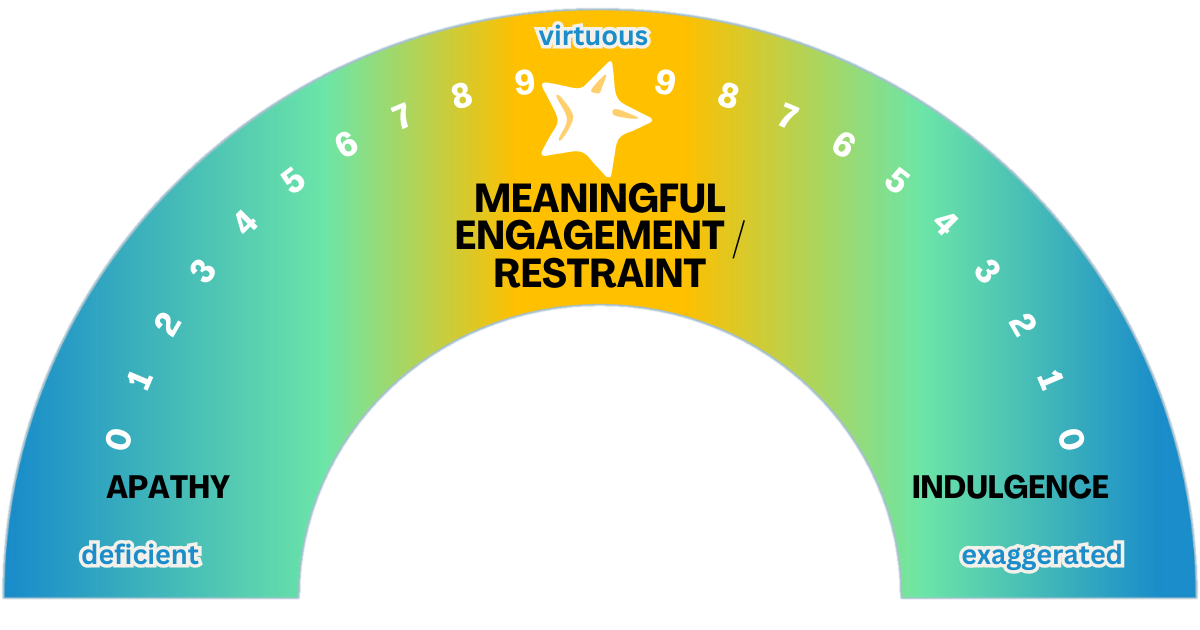Life is all around us, bustling with opportunities and challenges that demand our attention and participation. Each of us has unique mindsets and habits when it comes to approaching life’s experiences and challenges. In this section, we’ll delve into the character traits and attitudes that shape how we engage with life, how we navigate its complexities, and how we embrace its richness.
The Continuum
Along the continuum of engagement with life, individuals can fall at various points. On one extreme is apathy, characterized by a lack of interest or enthusiasm, resulting in a passive or disengaged approach to life’s experiences. On the other extreme is indulgence, marked by excessive or unrestrained involvement in life’s pleasures or activities, often leading to overconsumption or lack of moderation. The virtuous path lies in the center, where individuals engage meaningfully with life’s experiences while exercising restraint and moderation.
People may find themselves at various positions on this continuum. For instance, while some individuals may exhibit apathy towards certain aspects of life, such as career advancement or personal development, they may display passionate engagement in other areas, such as hobbies, relationships, or community involvement.
Apathy: On one end of the spectrum, there are individuals who drift through life with a lack of interest, seemingly detached from the world, as if moving through a fog of indifference.
Resigned Auto-Pilot: Moving along, we encounter those resigned to the monotony of their daily routine, going through the motions on autopilot, their aspirations buried beneath layers of complacency resigned to a fate they dare not challenge. But they will, at times, do something beyond the basics of life.
Mindful Engagement (Restraint): In a balanced state, individuals are active, deliberate, and aware participants in life. They consciously choose their actions and interactions, exercising restraint to avoid the extremes of apathy and indulgence, striving to live intentionally rather than on autopilot.
Passion: Continuing along the continuum, there are those whose intense enthusiasm sometimes borders on obsession, blinding them to reason, consuming their thoughts and actions sometimes to the point of detriment.
Indulgence: Finally, at the far end, we find individuals lost in the allure of pleasure, surrendering to its temptations without restraint, neglecting responsibilities and commitments in favor of fleeting gratification, and becoming prisoners to their own desires.
Benefits of Meaningful Engagement/ Restraint
When we find the balance between apathy and indulgence in our engagement with life, we cultivate a sense of purpose and fulfillment while avoiding the pitfalls of both disinterest and excess. This equilibrium allows us to appreciate life’s experiences fully, engaging meaningfully with the world around us while exercising restraint to prevent overindulgence or burnout.
Here are some benefits:
Enhanced Well-being. Being fully present and engaged can lead to greater satisfaction and happiness, as individuals find deeper meaning in their activities and relationships.
Improved Relationships. Mindful engagement fosters better communication and stronger connections with others, as one is more attentive and responsive.
Greater Productivity. Deliberate action and focus can lead to more effective and efficient accomplishment of tasks and goals.
Balanced Life. By avoiding the extremes of apathy and indulgence, individuals can maintain a healthier, more balanced lifestyle, promoting mental and physical health.
Personal Growth. Mindful engagement encourages continuous learning and self-improvement, as one is more attuned to their experiences and reflective about their choices.



